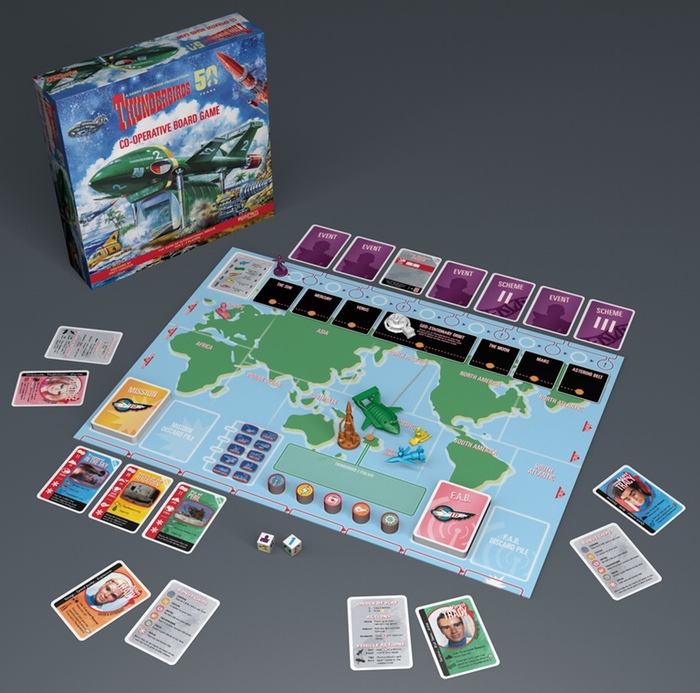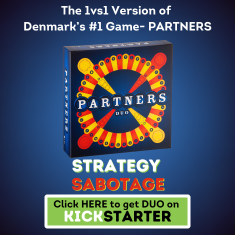User Experience, Cooperative Gaming, and Thunderbirds: An Interview with Pandemic Designer Matt Leacock

Matt Leacock is a game design legend, particularly in the realm of cooperative games. As the designer of Pandemic, Forbidden Island, and Forbidden Desert, he has risen to international acclaim. His latest creation, Thunderbirds, is a huge Kickstarter hit (the campaign ends on Sunday, March 29, 2015). We recently had the opportunity to speak to him about his past, present, and future in game design.
CGR: Hi, Matt! We're big fans of several of your games and we're thrilled to have the opportunity to do an interview. How did you first decide to get into game design?
 Matt: I’ve been modifying and creating games since I was a little kid. My uncle Pat was a big influence — he and I enjoyed creating our own, better games out of the scrapped remains of discarded roll-and-move affairs. I continued playing and creating all thorough college and into my professional career as a user experience designer. In 2006 I caught a break when Pandemic was picked up by Z-man games. That game’s success allowed me jump into game design as a full time career in July 2014.
Matt: I’ve been modifying and creating games since I was a little kid. My uncle Pat was a big influence — he and I enjoyed creating our own, better games out of the scrapped remains of discarded roll-and-move affairs. I continued playing and creating all thorough college and into my professional career as a user experience designer. In 2006 I caught a break when Pandemic was picked up by Z-man games. That game’s success allowed me jump into game design as a full time career in July 2014.
CGR: Your success is truly an inspiration to many aspiring game designers. Let's talk about cooperative games for a bit — they have gained a lot of traction in the gaming world, and your involvement with Pandemic, Forbidden Island, and Forbidden Desert has certainly had a major impact. What drives your interest in cooperative games?
Matt: I like designing cooperative games because my family enjoys playing them. Win or lose, there are rarely any hard feelings at the end of a cooperative game session. I also enjoy the challenge of coming up with novel mechanisms that generate the conflicts the players must face. I liken it to computer programming using only paper and cardboard.
CGR: With a software background myself, I totally agree with the comparison to computer programming — I have used this comparison myself on many occasions. I understand your career in user experience design led you to work with companies like Yahoo, Netscape, and Apple — how did this prepare you to be an excellent game designer?
Matt: There’s a tremendous overlap between user experience design and game design. The methods you learn for product design translate directly. I learned how to develop a concept, expand on it, refine, iterate, evaluate, and test different solutions. I learned to love low fidelity prototyping as well as a lot of research and evaluation methods on the job that were all directly transferrable. For example, now I often ask remote playtest groups to video record their sessions so I can closely observe interactions and note issues and opportunities for refinement. I also got a lot better at documenting and communicating my design work while working with distributed teams. It usually takes a team of people to develop a great game and my colleagues and partners are often scattered around the world.
CGR: We're excited for your latest game, Thunderbirds, based on the 1960s British TV series. Could you tell us a bit about the game and your experiences designing it?
Matt: In The Thunderbirds Cooperative Game you and your fellow players take on the role of International Rescue. You travel the world in your magnificent vehicles averting disasters while at the same time keeping an eye on the your nemesis, The Hood. If you can foil The Hood’s schemes — while ensuring that no one is harmed in a disaster — you all win the game.
Each turn, you move around the board, assembling characters, vehicles, and equipment in order to avert disasters. When you’re successful, you collect bonuses (such as technical and operational skill, intelligence, and teamwork) that represent the development of your character. You can then use these bonuses to help avert future disasters or spend them to foil the Hood’s schemes. Each turn, you need to evaluate the risks associated with every pending disaster. Pulling together an optimal team to perform a given rescue will greatly increase your odds of success, but doing so takes time which might be better spent on other threats. So you'll need to get really creative, work together, weigh risks, and push your luck at times in order to save the day and win the game.
The game offers the opportunity to reenact and create your own rescues — just like in the show. You can see if you have what it takes to be a member of International Rescue. (Plus, it’ll have really great miniatures.)

I took about a year on the design. The initial (tactical) parts of the game came very quickly. The longer term arc and the strategic bits unfolded more gradually through continual iteration. I’m now spending the majority of my time on the expansions that were unlocked during the Kickstarter campaign. The expansions will offer more characters, vehicles, events, schemes, a way to “level up” your character in order to increase your special powers during a game and the opportunity to play against your fellow players as The Hood.
CGR: What made you decide to model a game after a classic TV show?
Matt: Chris Birch of Modiphius approached me at Spiel in 2013 with the idea for the game. He had been wanting to make a Thunderbirds game for some time and was really excited about the prospect. I had never heard of the show at the time (I grew up in the States) but told him I’d check it out after I got home. After I watched a few episodes I immediately saw the appeal and thought it would make a great fit for a cooperative game, so I signed up.
CGR: Are there any other games you're working on that you can tell us about? We'd love to give a sneak peek to our readers.
Matt: Rob Daviau and I wrapped up the design of Pandemic Legacy last month. In Pandemic Legacy, you take on the role of a disease fighting team trying to make it through a horrible year on Earth. Each game session represents a month. If you win, you move on to the next month; if you lose, you have one more chance to play the month before time runs out and you get pulled into the next month. The game evolves each time you play it: characters get upgraded and can get scarred, cities go into decline, and new rules can come into play. Pandemic Legacy will be released in October 2015.
I’m also working on expansions to Pandemic: The Cure. The expansions will include new roles and other goodies which will bring even more variety and challenges to the game.
And I have another game due out soon (competitive!) that has not yet been announced.
CGR: This all sounds great, Matt! Thanks again and best of luck to you on your future designing efforts — we will most certainly be looking forward to them.
Matt: Thank you!







Visit my site锟斤拷http://www.cheapjerseystowholesale.com/
As a developer, I am always looking for reliable technological solutions, and white label online casino has been a real discovery for me. Their software works extremely efficiently, integrates quickly, and provides a high level of security. The company offers a wide range of products that can be adapted to the needs of any casino. With such solutions, I can be sure of the stable operation of the platform and comfort for end users.